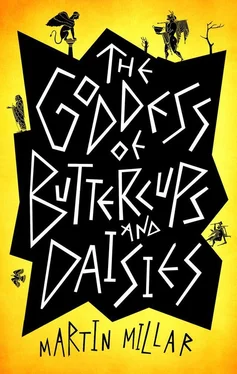Hermogenes frowned. ‘What’s the matter? You’ve just had a huge triumph and you don’t seem happy.’
‘A huge triumph? Only if the judges agree.’
‘It’s a triumph anyway. The audience loved it. And you heard Nicias. Your play might even help to end the war. How many playwrights can say that?’
Again Aristophanes tried to smile, but he couldn’t. He was too worried about the judges.
‘Is winning the competition really the only thing you care about?’
‘Yes.’
Hermogenes stared at him. ‘Sometimes I don’t like you very much, Aristophanes. Excuse me.’ He departed, back to his favourite youth, and a cup of wine.
Bremusa appeared. ‘I was listening to your conversation. Now I think I’m starting to understand culture. It means you have to defeat your opponents, right?’
‘It seems to be that way with me,’ admitted Aristophanes. ‘Others might not agree.’
He handed her some wine. ‘Hermogenes thinks it’s a flaw in my character.’
‘A flaw?’ said Bremusa. ‘The desire to win? How can that be a flaw?’
Aristophanes remembered the debt he owed Bremusa. ‘Thanks for saving me from that assassin. And for rescuing my phalluses. And for being the Goddess of Peace. More wine?’
‘When will the judges make their decision?’
‘Not for an hour or so. It always takes them a while. Probably because they need time to wolf down as much free food and drink as possible.’
Though Aristophanes’ mood had not much improved, it wasn’t affecting the celebrations around them, which had now grown. All sorts of people were crowding in, including Socrates and a few of his associates. As Aristophanes looked on, Theodota entered. His heart leapt, and he waited for her to come over and congratulate him. She didn’t come over. Instead she made directly for Socrates and draped herself over him like a curtain. Bremusa saw Aristophanes frowning. She followed his gaze.
‘Why do you spend so much time and money on a woman who isn’t really interested in you?’
‘I see that tact isn’t your strong point.’
‘Tact is for weaklings. Why do you care about her?’
Aristophanes shrugged, hopelessly. ‘I’m an artist. We’re not very good at relationships. You might say it’s another flaw in my character.’
Bremusa laughed. There was a slight touch of battle fury in it, but it wasn’t altogether an unpleasant sound. Aristophanes found himself taking to her more. Could she really have fought at Troy? He was still half-convinced she was a madwoman. Though she was good with a sword. Her companion Metris certainly couldn’t be from this world. Not with the effect she had on people. She was now doing a slow dance with Luxos in the middle of the room, and the young men looking on were hypnotised.
‘I’ve never been scared in battle,’ said Bremusa. ‘But when I went onstage I was trembling. I was blinded by stage fright. I hardly even saw the theatre.’
She pursed her lips. ‘I think I’ve missed out. Since I’ve been in Athens I haven’t really seen anything.’
‘Would you like to see the theatre now? It’s a fine building. If you look up, you can see the Parthenon with the moon shining through the columns.’
Aristophanes led Bremusa back outside. She’d undone the top of her leather armour because of the warmth of the evening. It made her look a little less militaristic. They gazed out at the rows of empty seats. Aristophanes loved the amphitheatre; he loved its circular shape and the happy world he could create there.
‘I was only nineteen when I put on my first play.’
Bremusa nodded. He asked her what she’d been doing when she was nineteen.
‘Fighting,’ she replied, which is what he’d been expecting.
She was standing close. Aristophanes had a sudden urge to take her in his arms. He might have done it, had not a freezing wave swept over the theatre, a shockwave that felt both physical and mental. Aristophanes staggered under the assault. As he regained his balance he saw a figure emerge from the shadows. A woman in dark clothes, with long hair, fine cheekbones and very pale skin. She had a twisted metal emblem hanging from a chain round her neck. Something snake-like, he couldn’t quite make it out.
‘My name is Laet.’
Given the powerful wave of negative feelings that emanated from her, her voice was rather soft. Laet strode towards them, very erect. She looked Aristophanes directly in the eye. It gave him the uncomfortable feeling that everything in his life had gone wrong, and would never be right again.
‘I enjoyed your comedy,’ she said. ‘Fine poetry. Fine songs. You have a rare command of the language. I laughed. It’s a long time since I’ve laughed at anything.’
She paused. ‘So I’m going to give you a choice. I don’t usually give people choices.’
Aristophanes was finding it difficult to speak.
‘What choice?’ asked Bremusa.
‘It’s time to make decisions. There are two conference rooms here. In one, the judges are discussing which play should win first prize. In the other, it’s the last session of the peace conference.’
Laet smiled. ‘Whichever room I enter, they’ll make a foolish decision.’
Aristophanes didn’t like the sound of this, but he was still finding it difficult to speak. Laet’s malevolent smile was making it worse.
‘Your play was the best,’ she continued. ‘But if I go into the judges’ room, they’ll make the wrong choice. You won’t win first prize.’
Laet paused for a moment, to let that sink in.
‘I could visit the peace conference instead. If I do that, they’ll make a bad decision. They won’t sign the treaty, and Athens will remain at war.’
She smiled her chilling smile. ‘Which room would you like me to enter?’
Aristophanes could still feel the freezing wave of misery, but at last he managed to speak. ‘Couldn’t you stay out of both?’
Laet’s expression hardened. ‘I’m entering one of them.’
At that moment Luxos emerged onto the stage, with Metris behind him. The nymph’s presence slightly alleviated the chilling aura emanating from Laet, though not by much.
‘What’s this?’ said Luxos. He sounded upset. ‘Aristophanes has to win. Otherwise he won’t let me recite my poetry at the next festival.’
‘That would be a shame,’ said Laet. ‘You do have some talent.’
‘If I don’t win I’m going to have a lot of difficulty paying my staff and helpers,’ said Aristophanes.
At this, Metris looked unhappy. ‘But I was going to use my wages to repair my temple.’
‘What’s happening out here?’ Hermogenes, his boyfriend, and Philippus arrived on the scene. ‘Did I hear someone say we’re not getting paid? Again?’
Philippus scowled. ‘I thought this year I’d finally be in the winning play.’
‘Eupolis or Leucon can’t win,’ said Aristophanes. ‘It’s just not fair.’
‘Nothing is fair these days,’ said Laet. ‘And you’re running out of time.’ She turned her head to stare at the wall at the far end of the amphitheatre, as if she could see through to the rooms beyond.
‘You have three minutes.’
Laet turned and walked back into the shadows, leaving a confused group of people behind her.
‘You have to make peace,’ said Hermogenes.
‘Eh… well…’ Aristophanes didn’t seem to share Hermogenes’ strong views. ‘That means I’ll lose the competition.’
‘Your whole play was about making peace!’
Alone among the gathering, Metris was unaffected by Laet’s freezing aura. She followed her into the shadows.
‘This isn’t very nice of you,’ said the nymph.
Laet didn’t reply.
‘Why are you so mean?’
‘Mean? I wouldn’t say I was mean. I fulfil a function.’
Читать дальше












